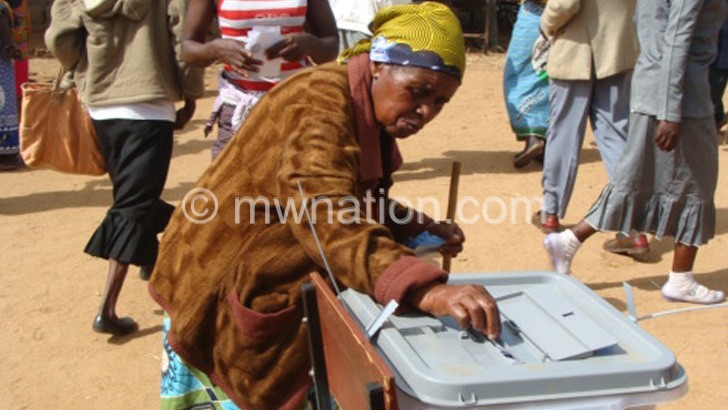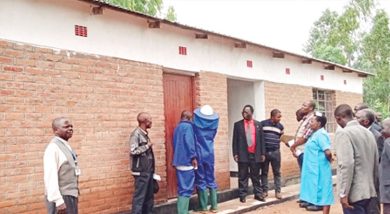Piecemeal changes on Electoral Reforms Bill
A private members’ Bill due to be tabled in Parliament during the current sitting is set to introduce seven amendments to the Presidential and Parliamentary Elections Act. The Bill proposes changes to how electoral results are managed, including establishment of constituency tally centres.
But a political analyst has since warned against piecemeal amendments to the Act, arguing they will not yield expected results.
Private Members Bill number 3 as it appears on the order paper, but officially the Presidential and Parliamentary Elections (PPEA) (Amendment) Bill 2016 was gazetted on December 15 2016 and has completed the 28 days maturity period before it is tabled.

The tabling of the Bill will follow the successful passing of a private members motion seeking Parliament’s permission to bring a private member’s Bill to support the electoral reforms.
According to a copy The Nation has seen, the Bill seeks to amend the Parliamentary and Presidential Elections Act, especially sections relating to the management of results and counting of votes.
Mover of the Bill, Lilongwe South member of Parliament (Malawi Congress Party-MCP) Peter Dimba said when passed, the Bill will ensure that every vote cast by the voter is properly counted in the Presidential and Parliamentary elections.
“Chances of this Bill succeeding are very high. There is nothing controversial in it. Any reasonable MP should be able to pass that Bill because it is enhancing credibility of the electoral process and its results,” Dimba said.
However, political science senior lecturer at Chancellor College Boniface Dulani has said although it was a welcome development that legislators were initiating legislations, piece-meal changes to the electoral laws would not address the problems in the management of elections in Malawi.
“It would have been better to table a much more comprehensive Bill rather than a piecemeal Bill which will just water down the electoral reforms as they are being proposed and will not achieve much,” he said.
Dulani also said although the MPs were justified to fear that the government would not bring the electoral amendments to Parliament before 2019, they should allow for the process being championed by the Malawi Electoral Commission and implemented by the Malawi Law Commission to be completed before pushing for private members bills.
“I sympathise that the government delays to bring bills to Parliament, especially where there are controversial proposals like the 50+1 but Malawi Law Commission is doing its work and we should all give this process a chance,” he said.
Opposition Malawi Congress Party (MCP) has sounded the loudest outcry since the 2014 Tripartite Elections, arguing that the polls were poorly managed, especially results at polling stations, which led to various anomalies and discrepancies at district and national tally centres.
So far, MCP president and leader of opposition Lazarus Chakwera has spoken in support of decentralisation of election processes, arguing that putting together results and transporting them over a long distance to some central place where the announcement takes place leaves room for tampering.
To ensure that the correct results reach the district tally centre, the Bill seeks to establish constituency tally centres by deleting the words “polling station” from sections 94 and 95 of the PPEA and substituting them with “constituency tally centre.”
According to Dimba, the constituency tally centre is where all results from the polling centres would be tallied.
“This is where the constituency returning officer shall on behalf of the Malawi Electoral Commission publicly announce results for both parliamentary and Presidential polls for that constituency,” Dimba said.
The Bill introduces a new section, Sec 93 (2) which states that “all recordings in relation to the number of votes, voters and ballot papers shall be recorded in both Arabic numerals and words” to deter alteration of results at the district tally centre where results from constituencies are tallied.
Section 93B will seek to clarify the process of compiling of the constituency results of elections starting with the returning officer at the constituency tally centre who would record the number of votes, number of voters and ballot papers cast and any discrepancies between these as well as any complaints received at constituency level.
Section 93b (3) states: “Representatives of each political party with a candidate or an independent candidate shall be entitled to observe the entire procedure followed at the constituency tally centre in computing the constituency results.”
The Bill also seeks to amend Section 25 of the PPEA by increasing penalties for those convicted of voter buying from seven years imprisonment to 21 years and the fine from K500 000 to K10 million.
In the electoral reform recommendations, stakeholders have recommended the amendment of the PPEA and the Local Government Elections Act to be integrated into a single Election Act.
In its briefing paper proposing non-legislative electoral reforms, the Malawi Electoral Support Network (Mesn) noted that changes were necessary in the registration and verification of voters, the delivery of election day materials, management of election results and strengthening of voter information and education.
On registration, Mesn proposed that MEC start building up an electronic voters’ register using data from the National Registration Bureau and recommended that presiding officers should also be required to post and record election results per polling stream to avoid disparities in results transmitted to tally centres.
The Special Law Commission is expected to come up with a report of recommendations on the way forward. n




